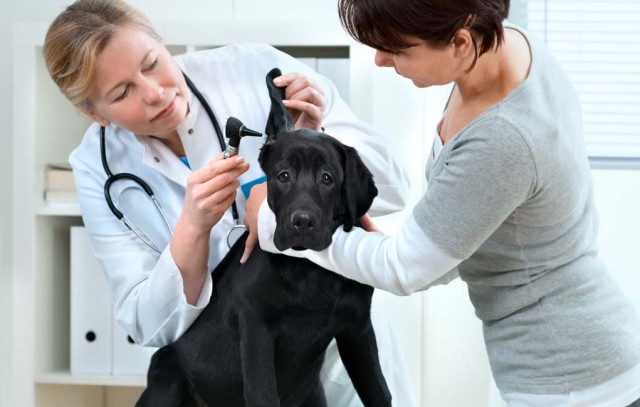
Table of Contents
Believe it or not, there are dog product-related health issues that we, vets, often run into.
Pet parents spend hundreds, if not thousands, of dollars a year on their canine companions.
They buy dog beds, chew toys, leashes, collars, and lots of other necessary and unusual pet products to spoil their dogs.
These pet products make life more comfortable for the dog and a little easier for the owner, but they aren't always safe.
Veterinarians see countless dogs every year that commercial dog products have injured.
Often it is because the owners are not using the product the way it was intended.
Another possibility is the product that they purchased was not suitable for their dog's size, weight, or breed.
It's imperative that pet owners select dog products with care.
You should research any product before you buy it and read reviews from other consumers.
It may only take a few minutes of research to figure out that a product will be harmful to your dog.
-

Photo: Geoff Stearns For example, some quick research on a popular dog toy may show that aggressive chewers are able to break pieces off and swallow them.
It is also important to read dog products' guidelines and use them only as directed by the manufacturer.
If not, you may end up like one of the other innumerable pet owners who need to rush their dog to the vet because he's had a bad experience with a commercial product.
Different types of dog products pose different threats. So it's important to know the risks involved in using a product before you purchase it.

Dog Product-Related Health Issues Vets Encounter Most Often
Any dog product that is not used responsibly can injure a dog. But as long as you supervise your pet and make wise purchases, most products are very safe.
So which dog products cause the most issues, and what problems do they typically cause?
My years in the veterinary field have given me some insight into this topic.
Disclaimer: This list is in no particular order. This article should not be considered professional pet health or training advice. Please talk to your veterinarian before using any new methods or dog products with your pet.
Retractable dog leashes
Retractable leashes may seem like a godsend to owners that want their dog to have a little more freedom while out for a walk. But they have a dark side.
Most dogs on retractable leashes are poorly trained in obedience, which can become an issue when using the leash properly.
At full extension, some of these leashes can put your dog up to 20 feet away from you.
This prevents adequate control of the dog and can lead to devastating circumstances.
One very common issue seen by vets is dogs that have been attacked by another dog while on a retractable leash.
RELATED: How to teach a dog to walk on a leash
I have also seen several dogs that have been hit by cars while on a retractable leash.
In both circumstances, the owners could not adequately control their pet's movement. The dogs bolted toward another dog or out into traffic.
The “braking” mechanism on the leash malfunctioned in one of these cases. So when the dog bolted, the brake did not stop the leash, and the dog was struck by a car.
[optin-monster-shortcode id=”mmevqhqfl46p1is5″]The thin lead that is standard on retractable leashes can also be a hazard to human and canine skin if wrapped around a finger, hand, leg, or paw.
These leads are also known to cut off circulation and damage the limb entirely.
Use a retractable leash safely
It is crucial that you do not give your dog too much slack while using a retractable leash.
If you do choose to use a retractable leash, make sure to get a quality one such as Flexi New NEON Retractable Belt Dog Leash.
You can then work on your pet's obedience skills, such as ‘come' when called to help prevent any potential problems.
It's a good idea to start with a standard leash, and once your dog is trained well, move him up to a retractable leash.
Also, inspect and test your leash often. Replace it if the braking mechanism seems to be faulty or if the leash does not retract properly.
Flea and tick shampoos and preventatives
Flea and tick shampoos contain harsh chemicals that can be very hard on canine skin.
This vet has seen countless dogs present for skin irritation after using flea and tick shampoos.
Sadly, many of these dogs had a skin infection secondary to the fleas, and it took longer for them to heal.
While these pet shampoos are less expensive than many veterinary-recommended once-monthly topical, such as Vet's Best Flea Itch Relief Dog Shampoo or oral flea and tick preventatives – your dog is much more likely to have a negative reaction to them.
In this case, spending a little extra on a quality pet product now could save you hundreds of dollars in unnecessary vet bills later.
RELATED: Best Dog Flea Treatment – Top 10 Solutions
Over-the-counter flea and tick preventatives also have a long history of causing adverse effects in dogs.
The most common problems are seen with “grocery store”-brand dog products that contain pyrethrins, such as those made by Hartz and Sargeants.
Skin irritation, hair loss, neurologic problems (muscle tremors, twitching), and vomiting are common side effects of these products.
If overdosed, which is easily done in puppies, neurologic symptoms like seizures can occur.
Other types, such as flea collars, simply don’t seem to work for very long but do not typically cause direct harm.
Follow your vet's advice!
While many veterinary-recommended products (such as the oral Capstar Fast-Acting Oral Flea Treatment for Dogs and topical Frontline Plus can cause side effects, they have a much higher margin of safety.
The bottom line is that this veterinarian recommends that owners use reputable pet products recommended by veterinarians.
Today, this is easier than ever and also affordable.
Safer dog products like Frontline Plus, Advantage 2, and K9 Advantix 2 have gone “generic” and are available at “big-box” pet stores and other retailers.
Always consult with your veterinarian before using any type of treatment on your pet to be sure that it is a safe option.
Bully Sticks and Rawhide Chews
The two most popular treats for dogs are the most common culprits for oral irritation, choking, and digestive issues.
The shape and hard texture can be problems for certain dogs, especially over-enthusiastic eaters that try to “gulp” everything down without chewing.
Nature Gnaws Bully Sticks and Jack & Pup Bully Sticks are not bad by themselves. They can satisfy a dog’s need to chew and can help remove tartar from the teeth.
But these treats are not safe for every dog. If your dog is a patient chewer and takes his time chewing these apart – they are not likely to pose a choking hazard.
However, you should always supervise your pet while they are chewing these types of products.
RELATED: Sunday's Recap – Are Raw Bones Good for Dogs?
Digestive issues are a little harder to predict.
If too large of a piece of treat is ingested, sometimes it is not fully digested and can cause an intestinal blockage.
Blockage can actually occur in the stomach or intestines; it is known as Gastrointestinal obstruction and is a fairly common condition.
If your dog develops diarrhea or vomiting (especially after eating) shortly after chewing on a bully stick or rawhide, seek veterinary attention.
These are the two biggest signs of Gastrointestinal obstruction.
The treatment usually consists of surgery to remove the blockage, which can get very expensive.
Dog Product-Related Health Issues: Choosing Dog Products Wisely
As the old saying goes, it's better to be safe than sorry, and choosing your dog products is no exception.
When selecting any product for your dog, do your research and ask your veterinarian for advice.
Not all products are right for all dogs. So we are here to help keep your canine companion as healthy as possible for as long as possible.
You can also consult consumer reviews.
They are usually accurate because the consumer isn't getting paid to write positive things about the manufacturer.
Chances are, if you find numerous consumer reviews stating that a certain product is hazardous, there's a good chance that your dog would have issues with it as well.
Disclosure: We may earn affiliate commissions at no cost to you from the links on this page. This did not affect our assessment of products. Read more here and find full disclosure here.















